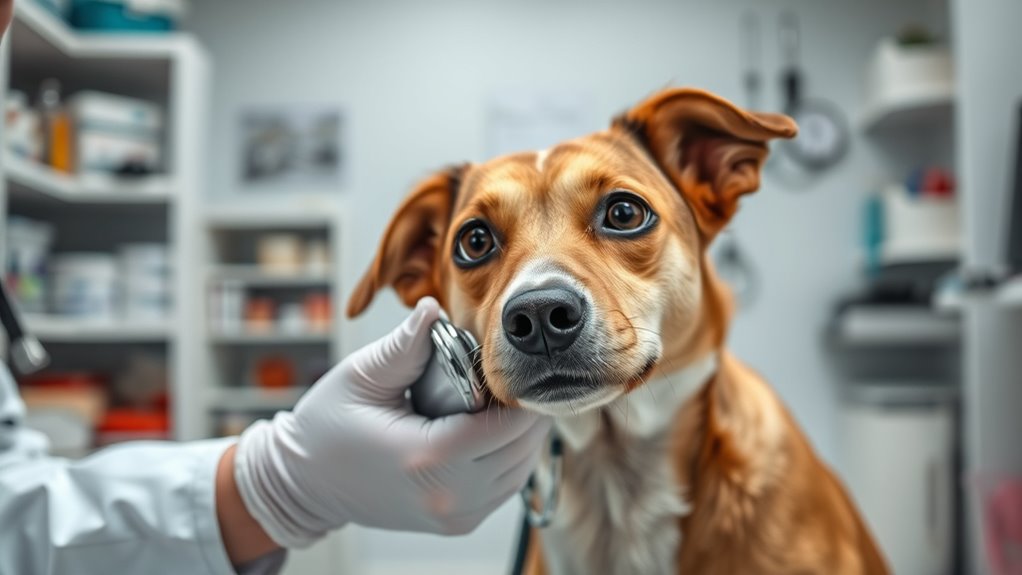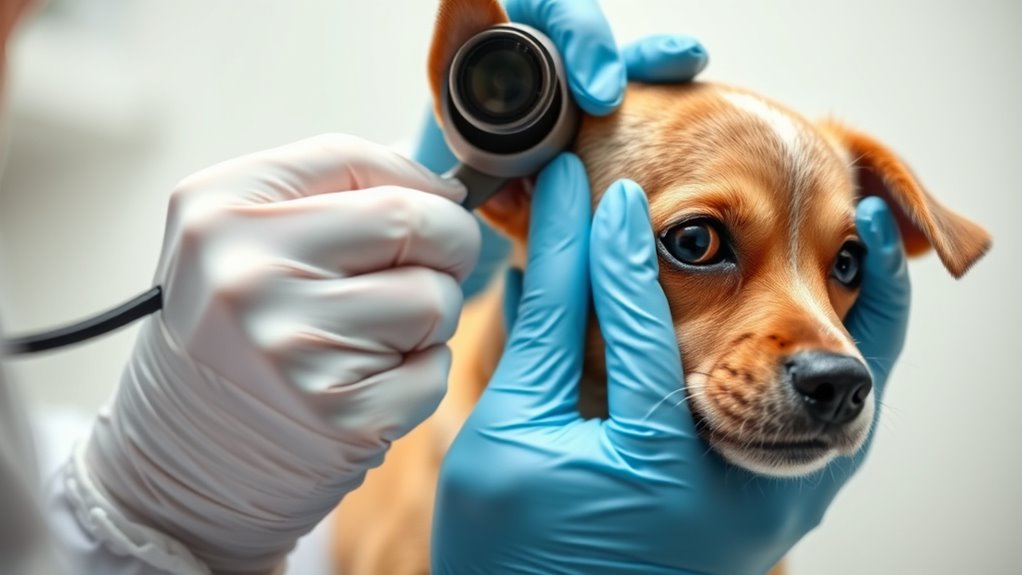During annual checkups, vets examine your pet’s teeth, gums, eyes, ears, skin, and coat for signs of infections, parasites, or health issues. They listen to the heart and lungs, check joints and weight, and may perform blood tests or diagnostics to catch problems early. Vaccination status is reviewed, and dental health is assessed to prevent future pain or infections. If you stay until the end, you’ll discover more ways vets keep your pet healthy.
Key Takeaways
- Veterinarians perform a comprehensive physical exam to assess overall health, including eyes, ears, skin, and vital signs.
- They check dental health for plaque, gum disease, and broken teeth to prevent pain and systemic infections.
- Vaccination status is reviewed and updated based on age, lifestyle, and risk factors to protect against diseases.
- Diagnostic tests like blood work may be used to detect hidden health issues early.
- The vet evaluates for parasites and monitors for any abnormalities or health concerns requiring intervention.

Regular annual checkups are a vital part of maintaining your health and catching potential issues early. When you bring your pet in for their yearly visit, your veterinarian takes a thorough look at their overall well-being. One important aspect they focus on is pet dental health. Poor dental hygiene can lead to pain, infections, and even systemic health problems if bacteria enter the bloodstream. During the exam, your vet will inspect your pet’s teeth and gums, looking for signs of plaque buildup, gingivitis, or broken teeth. They might recommend professional cleaning if needed and advise you on daily dental care routines to keep their mouth healthy throughout the year. Addressing dental issues early can save your pet discomfort and prevent more serious health complications down the line.
Another key component of the checkup is reviewing and updating vaccination schedules. Vaccinations protect your pet from a variety of contagious diseases, some of which can be life-threatening. Your veterinarian will assess your pet’s age, lifestyle, and exposure risks to determine which vaccines are necessary. They’ll ensure your pet is current on core vaccines like rabies and distemper, and discuss optional vaccines based on your pet’s environment and activities. Keeping vaccination schedules up to date isn’t just about protection; it’s also often a legal requirement, especially for rabies. Regular visits allow your vet to monitor how your pet responds to vaccines and catch any adverse reactions early. Additionally, advancements in automation technology are increasingly being incorporated into veterinary practices to improve diagnostic accuracy and streamline patient care.
Beyond dental health and vaccinations, your veterinarian performs a detailed physical exam during each annual checkup. They check your pet’s eyes, ears, skin, and coat, looking for signs of infections, parasites, or abnormalities. They also listen to their heart and lungs to detect issues like murmurs or respiratory problems. Your vet may recommend blood work or other diagnostic tests if they notice anything unusual or if your pet is at higher risk for certain conditions. This proactive approach helps identify health problems before symptoms appear, allowing for earlier intervention and better outcomes.
Frequently Asked Questions
How Often Should Senior Pets Have Checkups?
You should schedule senior pet wellness checkups at least twice a year. As your pet ages, their health needs more frequent monitoring to catch potential issues early. Regular checkups provide preventative care, ensuring your senior pet stays comfortable and healthy. By staying proactive with these visits, you help manage age-related conditions and maintain your pet’s quality of life for years to come.
What Signs Indicate a Health Concern Between Visits?
If you notice behavior changes or appetite loss in your pet, it’s a sign you should act quickly. These symptoms can indicate health concerns that need prompt attention. Keep an eye out for lethargy, vomiting, or unusual hiding. Don’t wait for their next checkup—if these signs appear, schedule a visit with your vet to guarantee your pet gets the care they need. Early intervention can make all the difference.
Are There Specific Vaccines Recommended During Annual Exams?
Did you know that over 70% of pet owners follow vaccination schedules diligently? During your annual exam, vets typically recommend core vaccines like rabies and distemper, along with non-core ones based on your pet’s lifestyle. Adhering to immunization guidelines helps protect your furry friend from preventable diseases. Staying on top of these vaccines ensures your pet remains healthy and safe, giving you peace of mind and a longer, happier life together.
How Can I Prepare My Pet for the Checkup?
To prepare your pet for the checkup, bring their vaccination records and any recent health concerns. Make sure they’re calm and comfortable beforehand, and consider brushing their teeth to support dental health. Watch for behavioral changes leading up to the visit, as these can indicate health issues. Bringing their favorite toy or treat can also help ease anxiety, making the exam smoother for both of you.
What Diagnostics Are Typically Performed During a Checkup?
Think of your pet’s checkup as a voyage into uncharted waters. During this journey, your vet conducts blood tests to uncover hidden health treasures and performs dental exams to ensure a bright smile stays intact. These diagnostics act as a compass, guiding you toward early detection of issues. By doing so, you help keep your furry friend healthy, happy, and prepared to explore life’s adventures with you.
Conclusion
Think of your annual checkup as tending to a garden. Just as you nurture each plant to prevent weeds from taking hold, regular vet visits catch small issues before they grow wild. Your pet’s health is the delicate bloom, requiring your attentive care. By staying vigilant, you’re protecting their future, ensuring a vibrant, flourishing life. Remember, with consistent care, you’re cultivating a bond that endures, rooted in love and attentive stewardship.










